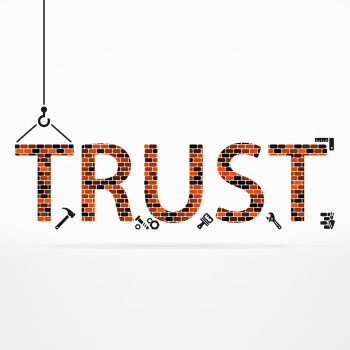By Judith E. Glaser | blog.vistage.com
Published: December 27, 2013

FEAR SOMEHOW TOUCHES almost every aspect of our lives. It is woven invisibly into the fabric of our existence and often sets into motion a chain of reactions and circumstances that affect the way we think and our behavior, for better or worse, with others.
As leaders we need to ensure that fear does not consume our firms and degrade the performance of our partners. Especially in small firms – where every interaction and ripple effect on the ‘productivity of a culture’ – being able to set the stage for trusting relationships enables you to get in front of the fear-curve and shape your culture for higher levels of success.
WHY is this important?
Neuroscientists are revealing – through the use of fMRI (functional magnetic resonance imaging) that when we are afraid, our brain goes into a state of distrust; we close down and move into protect behavior. We are not open to sharing and we are not open to learning. Instead, we become attached to our own beliefs and ideas and are not open to have healthy conversations about what’s really on our minds.
Firms grow when people are open to ‘share and discover’ from each other. Learning what is working and what is not, is the lifeblood of all organizations, especially small firms, where having open, healthy, candid and caring relationships is the essence for sustaining not only strong internal relationships but also strong relationship with clients.
HOW to Reduce Fear and Build Trust at Work?
The key to reducing fear at work is to eliminate mixed messages— the catalytic driver of fear—through direct and clear communication. WE-centric leaders lift people out of fear, frustration, and anger, the emotions that cause people to disengage from each other.
When people are uncertain of how they are feeling, when they feel disconnected they become reactive, project their anxiety onto others, create more fear, blame others for what is missing in their lives, reject first to avoid being rejected, and disengage. Conversationally Intelligence leaders create a culture that enables colleagues to feel connected, involved in living common values and vision, and trusted. When colleagues feel trusted, they work in concert, they learn from each other, develop higher-level skills and wisdom, meet performance goals, and turn breakdowns into breakthroughs.
Manage Three Vital Dynamics:
What can YOU DO to Build Trust…
- First, put your ego behind you— what matters is what “we can do together” not what “I” can do.
- Second, learn to manage your own reactions—bullying, intimidating, and micromanaging don’t get results or inspire others to higher performance.
- Third, and most importantly, let go of the past; focus on the challenges facing you and build healthy, mutually beneficial, trusting relationships.
Mastering these three dynamics will change everything. Your ability to set the stage for a trusting environment will dramatically increase, and your ability to lead will increase exponentially. Plus you will enhance your ability to create inspiring, healthy trusting environments where people work together for mutual gain, growth, and understanding.
What Can You Do With OTHERS?
Our level of trust can be changed, by practicing Conversational Intelligence™. C-IQ has three levels of conversational dynamics that you can master. You can elevate trust with others in your firms by changing the quality of your conversations. When you do, you reduce the ‘mixed messages’ and elevate clarity about relationships and the result will be profound. Your goal is to practice moving into Level III with others…
Conversational Intelligence & the Neuroscience of Trust
Level I: Transactional Conversations
Conversations that are mostly “telling people what to do” trigger fear and resistance. You may think you are communicating but you are not. You are trigger the lower brain and people are feeling you have an agenda, not their best interest at heart.
Level II: Positional
Conversations that are mostly “advocating your point of view” with low levels of listening, are also prone to create distrust. If you are selling your ideas and advocating your position, you also are sending non-verbal signals that your goal is to ‘win at all cost.’ Also signaling the brain to ‘distrust your motives.’
Conversations that are mostly “advocating your point of view” with low levels of listening, are also prone to create distrust. If you are selling your ideas and advocating your position, you also are sending non-verbal signals that your goal is to ‘win at all cost.’ Also signaling the brain to ‘distrust your motives.’
Level III: Transformational
Conversations that are mostly “sharing and discovering” where you are really interested in others thoughts and ideas, and are open to influence, are the highest levels of conversational dynamics. Listening is high, and you are communicating with both caring and candor, which sends signals of trust to those with whom you are communicating.
Here are some Conversational Intelligence™ Neuro-tips to remember:
Conversational Intelligence™ Neuro-tip #1: Trust and Distrust
Distrust activates the fear-networks in the brain – spewing a hormone call cortisol, which closes down conversations. Trust activates the trust-networks and also activates oxytocin, which facilitates conversations.
Conversational Intelligence™ Neuro-tip #2: Conversational Triggers
Conversations trigger physical and emotional changes in our brains and bodies through altering the amounts of two of the most powerful hormones that affect social interaction: oxytocin, which enables bonding and collaboration, and testosterone, which enables our aggressive behaviors.
As you weave, practice moving into Level III with others, you will find the quality of your conversations going, up, the wisdom that emerges from your conversations elevating and the feeling of ‘we’re all in this together’ rippling into everything you do – especially how you work with your clients.
“To get to the next level of greatness depends on the quality of the culture, which depends o the quality of relationships, which depends on the quality of conversations. Everything happens through conversations!” – Judith E. Glaser
- See more at: http://blog.vistage.com/communication/build-trust-through-conversational-intelligence/#sthash.hmtx1T3O.dpuf








